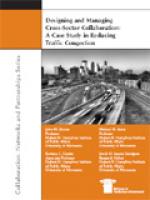
Designing and Managing Cross-Sector Collaboration: A Case Study in Reducing Traffic Congestion

In August 2007, five urban regions were selected by the USDOTSDOT to participate in a path-breaking federal transportation initiative. Known as the Urban Partnership program, the initiative funded a total of $1.1 billion in grants for integrated transit, highway pricing, technology, and telecommuting strategies aimed at reducing traffic congestion in major urban areas. The Minneapolis - St. Paul region was selected to receive one of the five grants. This report describes the history of that initiative, from collaboratively putting the proposal together in 2007, to grant award, to implementing the grant in 2008.
This report focuses specifically on a cross-sector collaborative effort to significantly reduce traffic congestion in the Twin Cities metropolitan area of Minnesota. The organizers of the program concluded that a collaborative, multi-modal approach was crucial to making real headway on a longstanding, costly, nearly intractable public problem. Cross-sector collaboration is now increasingly both necessary and desirable as a strategy for addressing many of society's most complex public challenges.
The authors describe the collaboration involved in obtaining and implementing the Minnesota Urban Partnership program. They offer insights about what contributes to successful collaboration and what hinders it. The report presents lessons learned for public leaders attempting to organize collaborations, including specific lessons for project sponsors and champions. Collaboration: Networks and Partnerships



